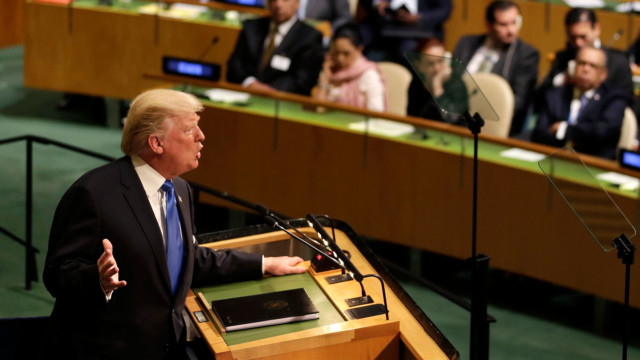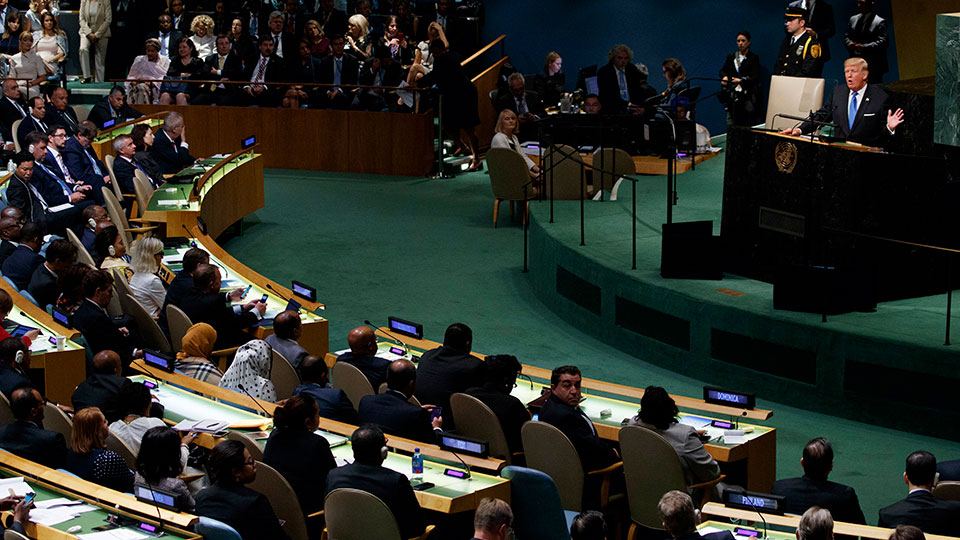A day after his stark U.N. speech, U.S. president Donald Trump met with the King of Jordan to discuss efforts to fight terrorism in the Middle East.
It was the first of several meetings scheduled for Trump in New York along the sidelines of the United Nations on Wednesday.
Trump praised King Abdullah II’s efforts to take in a wave of refugees from war-torn Syria. In turn, the king praised the two nations’ “special relationship” and denounced terrorism as “a scourge around the world.”
Meanwhile, Former Secretary of State John Kerry said Wednesday that Trump’s speech may have put America in isolation and danger.
In his speech, Trump vowed to “totally destroy North Korea” if the U.S. is forced to defend itself or its allies against the renegade nation’s nuclear weapons program, in a good-vs-evil view of a globe riven by chaos and turmoil.
Appearing on MSNBC’s “Morning Joe” show Wednesday, Kerry criticized Trump’s harsh rhetoric against North Korean leader Kim Jong Un.
Kerry said Trump’s harsh language will make it harder for the United States to engage in diplomacy on North Korea and other international issues.
Kerry also charged that Trump emphasized his “America First” mantra mostly to please his supporters at home rather than the world community. “You give a speech at the United Nations to bring people to the table,” he added.
The speech drew varying reactions from leaders:
China: Foreign Ministry Spokesperson Lu Dong said in a regular press briefing Wednesday that nations need each other. “President Donald Trump has mentioned about the idea of “America first” many times. In fact, it is beyond reproach that the leader of any state hopes to give priority and importance to the interests of his own country. But we should also come to realize that in today’s world with the rapid development of economic globalization, the interests of various countries have been highly integrated and any country can hardly seek development on its own. So we maintain that countries should work to build a community of shared future for mankind in the spirit of mutual benefit and win-win results,” he said.
Israel: Prime Minister Benjamin Netanyahu, a Trump ally, wrote on Twitter, “In over 30 years in my experience with the UN, I never heard a bolder or more courageous speech.”
and issued a powerful call to confront them in order to ensure the future of humanity.
— Benjamin Netanyahu (@netanyahu) September 19, 2017
Iran: Javad Zarif, the foreign minister of Iran, wrote that “Trump’s ignorant hate speech belongs in medieval times-not the 21st Century UN -unworthy of a reply.”
South Korea: “We believe (he) expressed a firm and specific stance regarding the important issue of maintaining peace and security now facing the international community and the United Nations.” Park Soo-hyun, spokesman for South Korea’s presidential office.
Sweden: “This was a bombastic, nationalist speech. It must have been decades since one last heard a speech like that in the U.N. General Assembly. … This was a speech at the wrong time to the wrong audience.” Margot Wallstrom, foreign minister of Sweden.
Venezuela: “No leader can come and question our democracy, can come and question our sovereignty. We do not accept threats from President Trump or whoever in this world.” Venezuelan Foreign Minister Jorge Arreaza.
Russia: “Syria, Cuba and Venezuela are (painted as) almost the worst dictatorships in the history of the humankind.” Konstantin Kosachev, head of the foreign affairs committee in the upper house of the Russian parliament. He said the speech was “contradictory,” mixing expressions of respect for nations’ sovereign rights with a “barefaced U.S. pretense to determine who has such rights and who does not.”
Outside of an oblique reference to a threat to Ukraine’s sovereignty, Trump made no mention of Russia or its president, Vladimir Putin. He chastised the U.N. for what he said was a bloated budget and bureaucracy but did not reiterate previous threats to cut Washington’s commitment to the world body. Instead, he pledged the United States would be “partners in your work” to make the organization a more effective force for world peace.
Story by the Associated Press with information from CGTN America.
 CGTN America
CGTN America United States President Donald Trump speaks during the United Nations General Assembly at U.N. headquarters, Tuesday, Sept. 19, 2017. (AP Photo/Seth Wenig)
United States President Donald Trump speaks during the United Nations General Assembly at U.N. headquarters, Tuesday, Sept. 19, 2017. (AP Photo/Seth Wenig)

